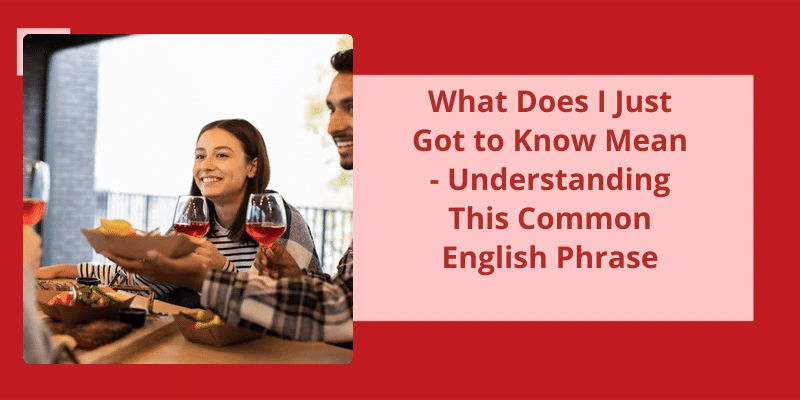This phrase may seem simple on the surface, but it’s a deeper nuance that implies a gradual, ongoing process of discovery and familiarity. It suggests that knowledge isn’t always a static or immediate thing, but rather a dynamic and evolving relationship between oneself and the world around them. Whether used in reference to people, places, or ideas, “I got to know” has a rich complexity that highlights the complexity of human experience and the importance of cultivating a deeper understanding of the world around us. So next time you hear someone say, “I got to know,” take a moment to appreciate the depth and richness of what they’re expressing.
What Is the Meaning of I Got to Know?
This means that the speaker is becoming familiar with new people gradually, through repeated interactions and experiences. It implies a process, rather than an instantaneous or sudden realization. Similarly, if someone says “I got to know myself better through therapy,” it means that they gained insight and understanding about themselves through a series of therapeutic sessions. In both cases, the emphasis is on the gradual journey of discovery rather than the endpoint of knowledge.
The phrase “I got to know” can also be used to describe a past event or experience that’s shaped ones understanding or perspective. For example, if someone says “I got to know poverty firsthand when I volunteered at a soup kitchen,” it means that they gained a deeper understanding of the challenges faced by people in poverty through their personal experiences.
Another way to interpret “I got to know” is as a way of expressing gratitude or appreciation. If someone says “I got to know my boss better at the company retreat, and Im really grateful for that opportunity,” it means that they value the chance to connect with their supervisor on a personal level. It suggests that the speaker sees the experience as enriching or valuable in some way.
It can refer to interpersonal relationships, personal growth, transformative experiences, or simple appreciation. In each case, it conveys a sense of journey and process, rather than a fixed point of understanding.
Examples of Situations or Experiences That Can Lead to a Person Saying “I Got to Know”
- Attending a class or lecture on a new topic
- Travelling to a new country or city
- Trying a new cuisine or cooking technique
- Meeting someone with a different cultural background
- Starting a new job or career
- Experiencing a life-changing event, such as a birth or death in the family
- Going through a personal or emotional challenge
- Learning a new skill or hobby
- Reading a book or watching a movie that expands their knowledge or worldview
Let’s take a moment to clarify a common issue in English language usage: get to know versus got to know. As a language learner, it’s important to understand which one is the most appropriate in different situations. In this case, got to know is the correct choice, as it’s in the past tense, while get to know is in the present tense. This subtle difference can greatly impact the meaning of your sentence. So, let’s explore this further.
Is It Just Get to Know or Just Got to Know?
At first glance, the phrases “get to know” and “got to know” might seem interchangeable. After all, they both involve the idea of becoming acquainted with someone or something. However, there’s an important distinction between these two phrases, particularly when considering proper tense usage.
When we talk about getting to know someone, we’re typically talking about a present or future process. For example, if you meet someone new, you might say, “Im looking forward to getting to know you better.”. This phrase implies that you’re beginning a journey towards acquaintance and that it will take time.
In the context of the statement “Welcome to ELL!” the best choice would be “got to know” because it’s referring to a past experience. The speaker is acknowledging that the new user has already spent time becoming familiar with the community through exploration or interaction.
It’s important to use the right tense in language to convey the intended meaning accurately.
Always consider the tense when using these phrases to ensure proper communication.
Source: word usage – Difference between ‘get to know’ and ‘got to know’
As we continue to explore common grammar mistakes in English, it’s important to recognize the correct usage of certain phrases. One such phrase is “got to know,” which is often used when referring to meeting new people. It’s important to use this phrase correctly, as saying “knew some new friends” is grammatically incorrect. In this article, we will delve into the proper usage of “got to know” and it’s importance in everyday conversation.
Is Got to Know Grammatically Correct?
The phrase got to know essentially means that you’ve become familiar with someone or something. In the context of making new friends, it implies that you’ve spent time with them and have learned more about them. This is an important distinction to make, as simply meeting someone doesn’t necessarily mean that you know them.
Using the phrase got to know isn’t only grammatically correct but also adds depth and meaning to your conversations. It conveys a sense of effort and investment in building relationships, rather than just making superficial connections.
One of the great things about the English language is that there are many different ways to express the same idea. However, as with any language, there are certain phrases and idioms that are commonly used and widely understood.
If youre not sure whether youre using got to know correctly, don’t hesitate to ask a native English speaker for feedback. They can help you refine your language skills and avoid common mistakes.
It’s important to use it correctly to avoid sounding awkward or confusing, so take the time to practice and seek feedback from others. With a little effort and practice, you can become a confident and fluent English speaker.
Explanation of the Difference Between “Got to Know” and “Got to Know About”
“Got to know” implies that the person has gained an understanding or knowledge of something through personal experience or interaction. “Got to know about” suggests that the information was obtained through secondhand sources, such as hearing about it from someone else or reading about it.
Conclusion
It denotes an active engagement with people, places, and ideas, where one gradually becomes acquainted with them, builds relationships, and gains knowledge. This phrase reflects the dynamic nature of human interactions and the importance of patience, persistence, and openness in our quest for learning and personal growth. By acknowledging that we "got to know" something or someone, we recognize the value of our experiences, the richness of our connections, and the power of our curiosity and intuition. Thus, the phrase “I got to know” serves as a reminder that learning is a lifelong journey characterized by discovery, humility, and empathy.






